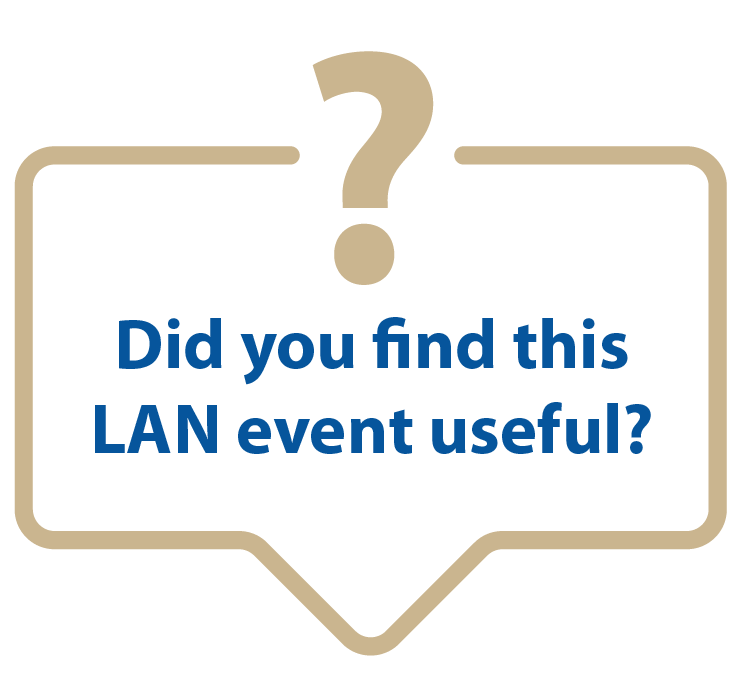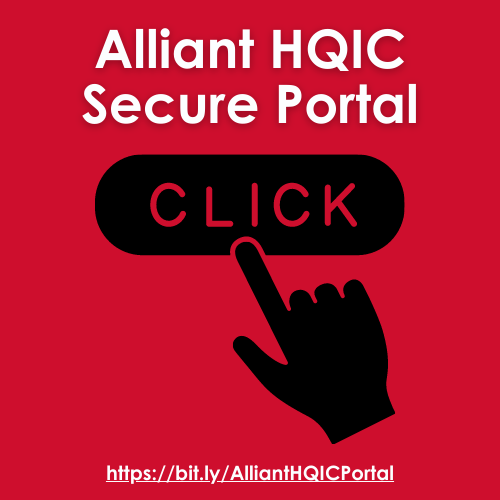|
|
|
|
This monthly newsletter highlights the latest insights, resources, and evidence-based best practices.
Our hope is that this newsletter makes it easy for you to stay on top of trends and allows you to provide the best possible care for those you work with and serve.
|
|
|

Save the Date: 2023 CMS Quality Conference
The CMS Quality Conference will be held May 1-3, 2023. This annual conference serves as a critical opportunity for discussions around improving the quality of care and advancing equitable practices and outcomes for beneficiaries. Health care quality is at the core of the work CMS and its contractors do every single day.
Quality improvement is a foundational component of CMS’ mission, and this year's theme–Building Resilient Communities: Having an Equitable Foundation for Quality Healthcare–will guide conversations and improvements around health care quality improvement that spark solutions to address America's health system challenges and incredible opportunities ahead.
Register Here
|
Upcoming Learning and Action Network (LAN) Event
I Want To, I Just Don't Know How: A Practical Guide for Advancing Health Equity
Tuesday, February 28, 2023, from 1-1:30 p.m. ET
This session will highlight best practices and examples for successfully implementing health equity strategies within hospital settings. Rosa Abraha, MPH, Alliant HQIC’s health equity lead, will address frequently asked questions from hospitals and engage in a discussion with participants. Learning objectives include:
- Discuss a model for embedding a health equity champion to meet the current regulatory requirements.
- Describe how to expand on the collection of Race, Ethnicity and Language (REaL) data and begin to analyze health-related social needs, e.g., health literacy, transportation needs, food insecurity etc.
- Discuss a framework for community and hospital partnership to advance health equity needs and improve patient outcomes.
Register | View Agenda
Connecting Your Hospital Culture of Safety to Patient Harm Reduction
Recorded on January 17
This session focused on patient safety culture and included discussions on preventing ADE Opioids, sepsis, pressure injuries and antibiotic stewardship.
View the Presentation
HQIC Quality Leader Summit
Recorded January 17
This event featured an update on performance measures, patient and family advisor councils (PFACs), educational events and resources.
View the Presentation and Recording
View All Upcoming Events Here

If Yes, Click Below.
Click here if you attended the June LAN event and were able to "use tomorrow" what you heard during the webinar.
View All Previous LAN Event Recordings
Community of Practice (CoP) Calls
CMS hosts CoP calls on the second Thursday of each month at 1 p.m. ET | 12 p.m. CT | 11 a.m. MT | 10 a.m. PT. The calls are open to all Alliant HQIC hospitals.
Promoting Zero Harm Through Tiered Briefs
Thursday, February 9
In this call, you will learn about the Medical University of South Carolina (MUSC) and its journey to ZERO HARM, which began with a review of communication processes and led to the realization that staff was unable to solve problems at the frontline. You will also learn about the Team STEPPS concept of Tiered Briefs, a foundational tool that promotes timely bi-directional communication from the frontline to executive leaders and back, and empowers all to solve problems quickly through the help chain. You will also hear how MUSC used this best practice and how large and small hospitals can adapt it to improve safety.
Register Here
The Importance of Organizational Components in Pressure Injury Programs
Recorded on January 12
Hospital-acquired pressure injuries affect 2.5 million patients per year in the United States. Many organizations are in a reactive mode, only focusing on pressure injuries once they develop. This reactive approach leads to overutilization of expensive resources, increased patient cost, decreased quality of life and increased staff time to perform wound care. This presentation provided the framework for a proactive pressure injury program based on an evidence-based interdisciplinary approach. A wound consultant subject matter expert reviewed organizational best practices for senior leadership support, clinical leadership, a unit-based champions model, process support, policy updates, emergency medical record enhancements, data collection and analysis and staff education.
View the Presentation
Monthly Office Hours-IP Chat
 Office Hours-IP Chats are quarterly networking events to build knowledge, share experience and provide support for hospital infection preventionists. The Office Hours-IP Chats are hosted by Amy Ward, MS, BSN, RN, CIC, FAPIC. Office Hours-IP Chats are quarterly networking events to build knowledge, share experience and provide support for hospital infection preventionists. The Office Hours-IP Chats are hosted by Amy Ward, MS, BSN, RN, CIC, FAPIC.
Click Here to register for our upcoming events:
- Wednesday, April 26, from 2-2:30 p.m. ET
- Wednesday, July 26, from 2-2:30 p.m. ET
- Wednesday, October 25, from 2-2:30 p.m. ET
Slides from previous Office Hours-IP Chats are available here. If you would like to schedule a one-on-one meeting with Amy, please let your quality advisor know. Questions? Contact Amy Ward at amy.ward@allianthealth.org.
|
 Alliant HQIC Online Portal Alliant HQIC Online Portal
Access the Alliant HQIC portal to view your assessments and measurement data, and chat with other HQIC-enrolled hospitals to share best practices, barriers and solutions. Download Portal Instructions to Get Started
The Value and Impact of HQIC
In November 2023, Alliant interviewed 14 HQIC-enrolled hospitals to identify the HQIC activities that provide the most value to participating hospitals and opportunities to improve program delivery in contract Year 3. Our key findings were published in an executive summary and shared with CMS. Read the Executive Summary
Behavioral Health/Opioid Stewardship
Analysis: Total Cost of Care Associated With Opioid Use Disorder Treatment
The opioid epidemic in the United States disproportionately affects Medicaid beneficiaries more than other groups. This results in a significant financial burden on state Medicaid programs. In an analysis published by ScienceDirect, researchers investigated the association of medication for opioid use disorder (MOUD) treatment initiation and linkage to ongoing care on overall healthcare costs of Medicaid Fee-for-Service patients. Read the Study | Download Medication-Assisted Treatment for Opioid Use Disorder Playbook
Drug Enforcement Administration Announces an Important Change
Is your facility planning to implement a medication for opioid use disorder program? On December 29, 2022, with the signing of the Consolidated Appropriations Act of 2023 (the Act), Congress eliminated the DATA-Waiver Program. As a result of this change:
- A DATA-Waiver registration is no longer required to treat patients with buprenorphine for opioid use disorder.
- Going forward, all prescriptions for buprenorphine only require a standard DEA registration number.
- There are no longer any limits or patient caps on the number of patients a prescriber may treat for opioid use disorder with buprenorphine.
- The Act does not impact applicable state laws or regulations.
Learn More
Adverse Drug Events
A Failure in the Medication Delivery System: How Disclosure and Systems Investigation Improve Patient Safety
A recent medication error at Vanderbilt University Medical Center contributed to the death of a patient. The ensuing criminal indictment of the administering nurse has shaken the medical community. It led to clinical staff questioning whether they could disclose patient safety incidents without fear of criminal prosecution. However, because of the publicity of this case, hospitals can benefit from the lessons learned and mitigate the risk of this and similar events at their facilities. Read Article
Study: Association Between Concurrent Use of Amiodarone and DOACs and Risk of Bleeding in Patients With Atrial Fibrillation
Amiodarone is a commonly used pharmacotherapy in patients with atrial fibrillation (AF), with potential drug-drug interactions with direct oral anticoagulants (DOACs). A study published by PubMed aimed to assess the bleeding risk after co-prescribing amiodarone and DOACs among adults with AF. The population-based, nested case-control study was conducted in Ontario, Canada. Ready Study
Shared Decision-Making for Drug-Drug Interactions: Formative Evaluation of an Anticoagulant Drug Interaction
Warnings about drug-drug interactions (DDIs) between warfarin and nonsteroidal anti-inflammatory drugs (NSAIDs) within electronic health records indicate potential harm but fail to account for contextual factors and preferences. A new tool called DDInteract enhances and supports shared decision-making between patients and physicians when warfarin and NSAIDs are used concurrently. DDInteract was designed to be integrated into electronic health records using interoperability standards. Read More
Antibiotic Stewardship
Quality of Antibiotic Prescribing in a Large Direct-to-Patient Telehealth Program: An Observational Study
Telehealth use, which has expanded during the COVID-19 pandemic, is expected to grow, yet limited information exists on the quality of telehealth services compared to other forms of care, particularly since physical exams and point-of-care testing are necessarily limited in telehealth. To date, findings on the quality of direct-to-patient telemedicine, a specific type of telehealth, have been mixed. Rates of antibiotic prescribing for acute respiratory infection are higher for televisits than outpatient practice or urgent care center visits, while follow-up visit rates, possibly indicating treatment failure, are comparable across televisits, physicians’ offices, and emergency departments. Read More
Patient Safety
Report: ‘Disturbing’ Rate of Adverse Events During Hospital Stays
All Cause Harm appears to be an increased focus for CMS, particularly as part of our HQIC work. In a recent report published by CMS, a new study shows that nearly one in four people admitted to the hospital have an adverse event during their stay, and the events were less likely to happen at smaller hospitals compared to larger ones. Read Report
Implementing Peer Messengers To Promote Professionalism in Nursing
A new study in the January 2023 issue of The Joint Commission Journal on Quality and Patient Safety evaluated the feasibility of implementing the Co-Worker Observation System (CORS), a tool and process to address disrespectful behavior through feedback from trained peer messengers for staff nurses. CORS has decreased instances of unprofessional behavior among physicians and advanced practice providers. Read More
Improving Communication From Hospital to Skilled Nursing Facility Through Standardized Handoff
Transitions from hospitals to skilled nursing facilities remain a patient safety challenge. Using a structured handoff tool will decrease the wait time for receipt of controlled medications and intravenous antibiotics and the time for medication administration.
The Alliant HQIC created a free, downloadable interfacility transfer form. Use this tool to ensure receiving facilities are aware of current and historical infectious disease diagnoses or current signs and symptoms, antibiotic use, vaccination status, and the presence of indwelling medical devices. Download Interfacility Transfer Form
NHSN
NHSN Annual Training Coming in March 2023
The National Healthcare Safety Network (NHSN) annual training will be held March 21-23, 2023. The training will be virtual, and registration will be available soon.
Readmissions/Care Transitions
Fiscal Year 2023 Hospital Readmissions Reduction Program (HRRP)
The CMS.gov website provides valuable Hospital Readmissions Reduction Program (HRRP) information, including FAQs, fact sheets, dates and more. Visit Website
Payment Reduction Methodology
The CMS calculates the HRRP payment reduction, which is a weighted average of hospital performance across the readmission measures during the HRRP performance period. CMS applies the payment reduction to all Medicare fee-for-service base operating diagnosis-related group payments during the fiscal year. Read More
Readmissions and Health Equity: Indigenous Determinates of Health
What is the readmission rate for American Indians and Alaska Natives (AI/AN) in your facility? How do you partner with your tribal communities? Consider these recommendations from the National Indian Health Board, 2022:
- Embrace strengths - success is collective
- Adopt a holistic approach and focus on overall well-being, not just health care services
- Honor indigenous knowledge and lived experiences
- Involve tribal elders, counsels, community
- Embrace “promising practices” alongside evidence-based practices
- Support culturally specific training
Learn more:
Indigenous Determinates of Health | Indigenous Knowledge Guidance for Federal Agencies | National Indian Health Board, Health Equity
Health Equity
I Want To, I Just Don't Know How: A Practical Guide for Advancing Health Equity
Tuesday, February 28, 2023, from 1-1:30 p.m. ET
This session will highlight best practices and examples for successfully implementing health equity strategies within hospital settings. Rosa Abraha, MPH, Alliant HQIC’s health equity lead, will address frequently asked questions from hospitals and engage in a discussion with participants. Learning objectives include:
- Discuss a model for embedding a health equity champion to meet the current regulatory requirements.
- Describe how to expand on the collection of Race, Ethnicity and Language (REaL) data and begin to analyze health-related social needs, e.g., health literacy, transportation needs, food insecurity etc.
- Discuss a framework for community and hospital partnership to advance health equity needs and improve patient outcomes.
Register and View Agenda Here
|
Public Health Emergency Information & Resources
Long COVID Self-Care Toolkit
It’s estimated that as many as one in five adults who had COVID-19 have ongoing symptoms. Symptoms that linger, many severe, are frequently called Long COVID, a condition that can be disabling. Alliant Health Solutions, strategic partners of the Morehouse School of Medicine's National COVID Resiliency Network, developed a toolkit for individuals who may have Long COVID. Each page can be a separate, standalone document for self-advocacy, self-care and tracking information. Access the Toolkit
|
Best Practices Corner
Upson Regional Medical Center Partners With MedPro EMS
Upson Regional Medical Center in Thomaston, Georgia, has partnered with MedPro EMS to provide routine and emergent patient transports. Read Article
|
|
|
Connect with us!
    Click here if you'd like to share your corporate profiles with us and we'll connect with you!
Click here if you'd like to share your corporate profiles with us and we'll connect with you!
|
| |
Hospital Quality Improvement Project Collaborators


|
| |
For more information about Alliant Health Solutions, visit the website: www.allianthealth.org
For questions or information about free technical assistance, please contact:
Share this email with a friend or colleague:  
|
|
|
|
|